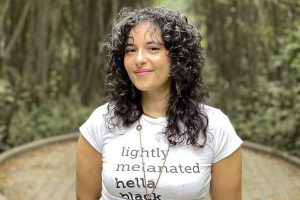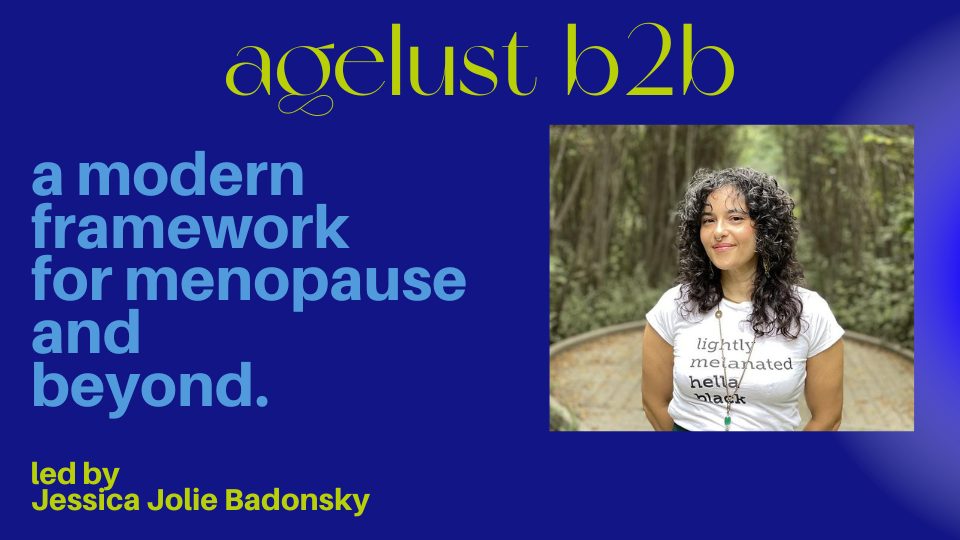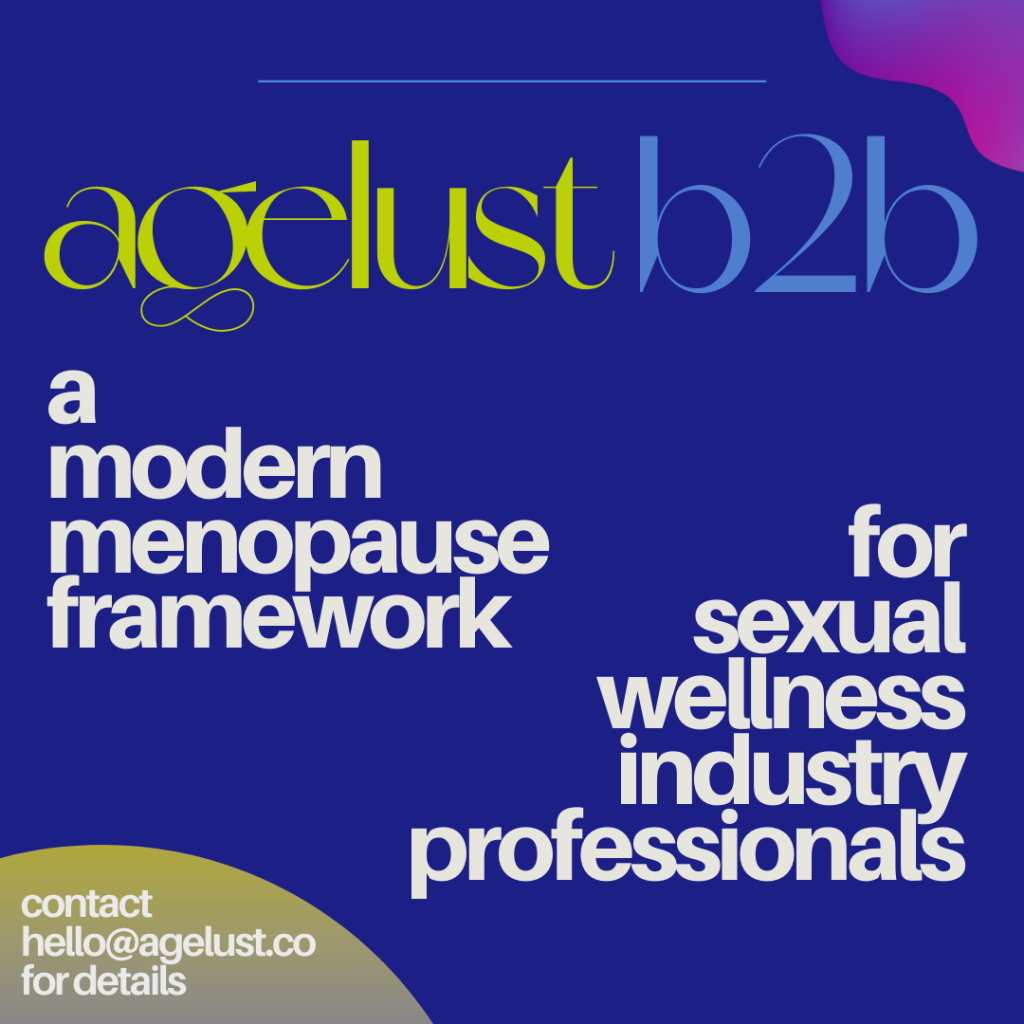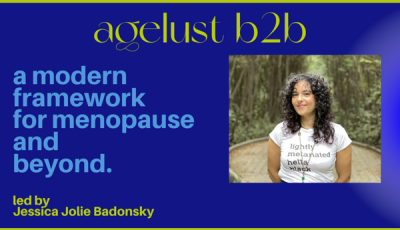Badonsky – Why the Adult Industry Needs to Understand Menopause
 Jessica Jolie Badonsky, a Board-Certified Family Nurse Practitioner and a certified provider through the North American Menopause Society is an expert in educating the adult industry about how to approach menopausal women. At first thought, this may seem like “why?” is there really a difference in how companies offer products, porn, services etc. to women of this age?
Jessica Jolie Badonsky, a Board-Certified Family Nurse Practitioner and a certified provider through the North American Menopause Society is an expert in educating the adult industry about how to approach menopausal women. At first thought, this may seem like “why?” is there really a difference in how companies offer products, porn, services etc. to women of this age?
Yes.
When you take a good hard look at advertising and how they’re portrayed to in the media, you find there is prevalent ignorance about the whole process based in ageism, sexism and misogyny. Perhaps even worse, there’s an avoidance of this large group of consumers as if they are no longer sexual beings.
That couldn’t be further from the truth.
In this fascinating interview, Jessica talks about the need for businesses to understand consumers that are going through perimenopause, why it’s important to their bottom line and how she’s doing everything she can to change perceptions with her new program – Agelust – a B2B seminar set to debut in March that teaches businesses how to market to and understand this growing sector of our population.

What got you interested in teaching sex education and how did you end up becoming an expert in aging and sexuality?
Years ago, when I was a new nurse, I noticed that there were many patients who asked questions about sex and sexuality, and how their illnesses, surgeries – whatever it was – would affect their sex lives. I can’t remember what sparked my research, perhaps a patient mentioned female ejaculation or a relevant topic, but I was led down a deep rabbit hole of peer reviewed journal articles. That eventually turned into a discussion with the Chief Resident for the urology department.
When I brought it up, she looked at me and said, “What are you talking about? We barely study men’s sexuality in med school, what makes you think we talk about women’s sexuality in med school?”
This was in 2009 – before I knew about AASECT – and I started researching, studying and talking to patients on my own. Because so many of these individuals were older adults, my focus was on the connection between their chronic illness or physical limitations for example, and sex. Eventually I started presenting educational workshops at the hospital and running a group on these topics for people over 60.
Why is there a need to educate adult manufacturers and retailers about how menopause is talked about and portrayed?
The foundation of nursing is education and a focus on quality of life – and sex is a quality-of-life issue. There are nurses, nurse practitioners and doctors for that matter who will do the bare minimum to help patients feel comfortable, and there are others who want the patient to heal and flourish from a long-term perspective.
I think the same can be said for the adult novelty industry.
There are manufacturers and retailers who talk the talk; and there are those who talk the talk and walk the walk. For example, those who are truly committed to 1: enhancing the pleasure of their customers, 2: creating genuine relationships with them; and 3: doing more than just giving lip service to this massive life transition.
When people say or hear the word “menopause,” I believe there is a dramatic association with women sweating, fits of rage, and the general assumption of being “dried up.” The “modern” menopause mentality is the intersection of sexism, misogyny and ageism. What (younger) people in our industry don’t see is that people who are just entering this phase were ravers and club kids! They are analog and digital. (Myself included.) Most of our parents knew what free love was. They may have dropped acid; were excited by the first birth control pill or may have watched people who they loved die from AIDS.
People going through perimenopause are not outdated – but that perception means that they are overlooked most of the time.
The idea that menopause is an “end of life” stage needs to go. Peri and postmenopausal consumers are whole, creative and expansive humans with sexual needs – they are daring and sexy in later decades.
Ideally, the adult industry will adopt this mentality for the well-being of our consumers.
What is one of the biggest myths out there about menopause and what do businesses need to understand to reach this age group in a more positive way?
- The biggest myth is that menopause is THE process. In reality, menopause is a one-day event. “Menopause” marks the 365th consecutive day of not having a period. The actual process – everything before – is PERIMENOPAUSE, AKA “climacteric,” which I love because it sounds like a build up to a climax. Everything after that one-day event is post menopause.
- Not all of the folks who go through perimenopause are older or middle-aged. Menopause can happen early for a number of people. A few instances would be surgical means (like hysterectomy), or for Trans folks who are changing their hormonal composition.
What is your biggest pet peeve about how menopausal women are portrayed in advertising and where do you think that stems from?
The general fear of everything down there.
I believe there is a lot of ignoring when it comes to genitals in all advertising, whether it comes to menstrual products or pleasure. There is also a misconception that “to be a woman is to suffer,” and “to age is to be in pain.” Both are false. Many products and advertisements create a “solution” for the wrong problem and are approaching consumer issues from a place of internalized misogyny and ageism.
What went into developing your menopausal program and what was the most difficult thing about getting it up and running?
The menopausal transition touches all cells of the body from head to toe, and can also bring up feelings of shame, sadness, anger (as well as freedom and fertile possibility).
While simplification is a challenge for me, distilling that message into evidence-based insights and solutions that can positively impact this industry is a task I am very excited about. Getting decision makers – especially those who have never had a period – excited about effectively nurturing and guiding the end users who are going through this evolution might be tough. But everyone knows someone who has either transitioned through or will transition through their climacteric journey of perimenopause!
Real talk, in two years there will be 1 billion people who will call themselves menopausal. That is A LOT of people. This means that there will be close to 1 billion people who are, or who will be thinking, “what the f*** is happening to my body?!”
I could continue with my coaching of small consumer groups because I love it, and I hope they share their discoveries with their communities – or I can impact a massive industry whose goal is to create pleasure, educate consumers and potentially touch one billion lives.
What are your goals for Agelust B2B in 2023 and beyond?
The goal of the program is to create a more modern, less antiquated framework of perimenopausal education for all adult industry professionals.
I hope to instill the message that menopause, sex, and pleasure are deep quality of life issues. I hope this program inspires manufacturers and retailers to acquire a thorough knowledge, and almost anticipatory understanding, of what folks in this transition are going through and what can bring them pleasure – beyond “menowashing” products, packaging and design before a false narrative consumes our industry.
Ultimately, I would like to facilitate a more informed dialogue around the aspects of a changing body, which will in turn benefit the end users that product manufacturers, retailers and sales associates are committed to helping.
Beyond 2023, I see Agelust B2B evolving into creative business partnerships. I would love to collaborate with a manufacturer to create a pleasure product line specifically geared towards the perimenopausal body. Additionally, I plan to launch other Certification Programs that empower adult professionals to talk about pleasure in terms of aging, menopause, and even illness. Agelust will continue to evolve because age does not exclude innovation.
Those who are interested in the B2B program can submit a preliminary application here. You can also find and follow the latest Agelust updates on Instagram @agelust.co and listen to the Agelust podcast HERE.













